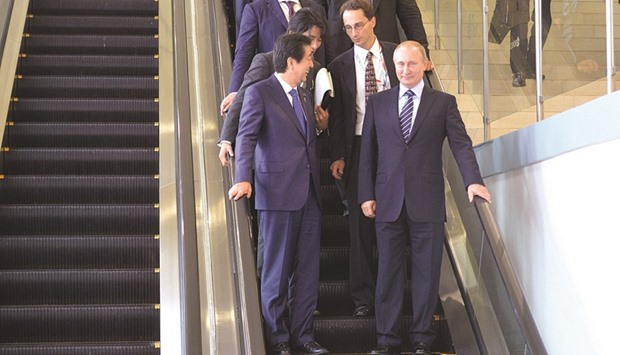Japan’s minister for economic cooperation with Russia said his nation’s push to boost commercial ties with its neighbour was no act of charity.
Thirty joint economic projects due to be approved by Prime Minister Shinzo Abe and President Vladimir Putin at a summit in Japan next month are a “win-win situation for Japan, even on their own,” Hiroshige Seko said in an interview in Tokyo on Tuesday. “These cooperation projects don’t mean we are giving money, or donating things. They will be developed on a business basis. This will be a major positive for Japanese industry.”
Japan’s leader put forward eight potential areas of economic cooperation – including energy, health and urban environments – in a meeting with Putin in May. Seko declined to comment on the content of the 30 projects, but said energy cooperation was an important issue for both countries.
Such cooperation could help Japan diversify its energy supply sources as it imports almost all its fuel needs, while Russia, struggling to climb out of recession amid western sanctions and low oil prices, can gain a market share in Asia’s second-biggest economy. To this end, Japanese lawmakers are revisiting a plan to build a $6.7bn natural gas pipeline linking Sakhalin island with Tokyo.
“Japan is trying to reduce its dependence on the Middle East,” Seko said. “Cooperation with Russia, this doesn’t necessarily mean a pipeline, but bringing in energy from the north is in line with Japan’s energy strategy.”
The dispute over four islands north of Hokkaido, known as the Northern Territories in Japan and the Southern Kurils in Russia, will be a prominent issue at the summit set to be held in Abe’s home constituency in Yamaguchi, southern Japan. The nations have been unable to sign an official peace treaty since Russia invaded the islands in 1945, expelling thousands of Japanese residents.
Seko said that the economic cooperation plan was independent from Abe’s bid to resolve the seven-decade dispute while in office.
“We are not taking a position of thinking about the quid pro quo,” Seko said. “Economic projects are proceeding at a pace that has not been seen before. Then this will contribute further to political stability, which will lead again to developments in the economic field. I think it would be good if political relations and economic relations form a virtuous cycle.”
Seko is due to fly to a meeting of Pacific nations in Peru, where he had been set to meet with Russian Economy Minister Alexei Ulyukayev to finalise action plans on the projects. While that meeting is now off after Ulyukayev was taken into custody over a bribery accusation this week, Seko said his detention was unlikely to affect progress on bilateral cooperation.
The Japanese minister also declined to comment on media reports that the government is considering an investment in Russian state oil firm Rosneft, part of which has been put up for sale to help cover a hole in the country’s budget. Japan’s parliament passed a law last week that would enable a government-funded agency to invest in foreign state-owned oil Corps.
Abe’s close relationship with Putin, along with a flurry of meetings between officials from the two sides in recent months, has raised hopes in Japan for progress on the long-awaited peace treaty. But James Brown, the author of a book on the bilateral relationship, said the government could be trying to shift expectations for the summit.
“Having realised that no major breakthrough is forthcoming in December, the Japanese side will clearly be looking for a way to sell the meagre results of the Yamaguchi summit to the Japanese public,” said Brown, an associate professor at Temple University’s Japan campus. “Emphasising the economic benefits could be one way of doing this, but it is not likely to be enough.”

Russian President Vladimir Putin (right) and Japanese Prime Minister Shinzo Abe ride down an escalator during their meeting on the sidelines of Eastern Economic Forum in Vladivostok, Russia (file). Thirty joint economic projects due to be approved by the two leaders at a summit in Japan next month are a ‘win-win situation for Japan, even on their own,’ Japan’s minister for economic cooperation with Russia Hiroshige Seko said.
